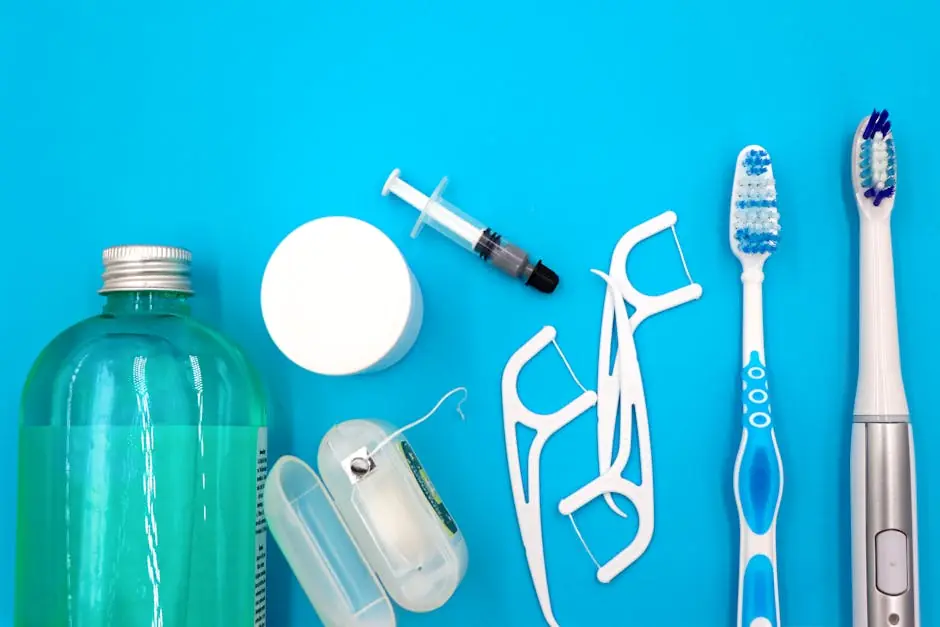
Gum disease prevention tips are essential for keeping your smile bright and your oral health in check. To lower the risk of periodontal disease, one can follow these simple practices:
- Practice regular oral hygiene: Brush twice daily and floss.
- Mind your diet: Consume foods rich in vitamin C and reduce sugar.
- Avoid tobacco: Smoking and chewing tobacco harm gums.
- Manage stress: Lower stress levels to prevent bruxism.
- Schedule regular dental visits: Professional cleanings are crucial.
Gum disease, often overlooked, can lead to severe oral issues if not prevented effectively. In its early stages, gingivitis is manageable with consistent care, reinforcing the importance of these fundamental steps. Keeping your gums healthy improves not only your smile but also your overall well-being.
As Dr. Aghiad Kandar, DDS, with over 15 years of dental expertise and an emphasis on comprehensive care, I've seen how vital it is to prioritize gum disease prevention tips. Such measures are integral to achieving long-lasting oral health, setting the stage for our deeper dive into gum care.
Practice Good Oral Hygiene
Maintaining good oral hygiene is the cornerstone of gum disease prevention. Let's break it down into three simple steps: brushing, flossing, and using mouthwash.
Brushing
Brush your teeth twice a day for two minutes each time. Use a soft-bristled toothbrush and fluoride toothpaste. The American Dental Association (ADA) recommends using gentle, circular motions to avoid damaging your gums and enamel.
- Tip: Replace your toothbrush every 3-4 months or sooner if the bristles are frayed.
Flossing
Flossing is just as important as brushing. It removes plaque and food particles that a toothbrush can't reach. Floss at least once a day, preferably before bedtime, to keep your gums healthy and prevent gum disease.
- Tip: Use about 18 inches of floss, wrapping most around your fingers and gently sliding it between your teeth.
Mouthwash
Rinsing with mouthwash can help reduce plaque and prevent gingivitis. Look for a mouthwash with the ADA seal of approval to ensure it's effective. Mouthwash reaches areas that brushing and flossing might miss, providing an extra layer of protection.
- Tip: Swish the mouthwash around your mouth for 30 seconds after brushing and flossing.
By incorporating these simple practices into your daily routine, you can significantly reduce your risk of gum disease and keep your smile bright. Next, we'll explore how dietary choices can further support healthy gums.
Dietary Considerations for Healthy Gums
Eating right isn't just for your waistline—it's a big part of gum disease prevention tips too. A balanced diet keeps your gums healthy and your smile bright. Let's explore what you should focus on.
Balanced Diet
A balanced diet means eating a variety of foods to get all the nutrients your body needs. Your gums, just like the rest of your body, need vitamins and minerals to stay strong.
- Include: Fruits, vegetables, whole grains, and lean proteins. These foods help fight inflammation and keep your gums in good shape.
Vitamin C
Vitamin C is a superstar for gum health. It helps repair tissues and keeps your gums from bleeding.
- Eat plenty of: Oranges, strawberries, kale, and broccoli. These foods are packed with Vitamin C, which is crucial for maintaining healthy gums. If you're not getting enough from food, consider a supplement.
Hydration
Water is your best friend when it comes to oral health. Staying hydrated helps wash away food particles and bacteria that can lead to gum disease.
- Drink: Plenty of water throughout the day. It helps produce saliva, which naturally cleans your mouth and protects your gums.
By focusing on these dietary considerations, you can support your oral health and keep gum disease at bay. Next, we'll talk about lifestyle changes that can help prevent gum disease.
Lifestyle Changes to Prevent Gum Disease
Making a few lifestyle changes can have a big impact on your oral health. Here are some gum disease prevention tips that are easy to follow.
Quit Smoking
Smoking is a major risk factor for gum disease. It weakens your immune system, making it harder for your gums to fight off infections. The CDC reports that smokers are twice as likely to have gum disease compared to non-smokers.
- Action Step: If you use tobacco, consider quitting. It can significantly reduce your risk of developing gum disease.
Reduce Stress
Stress affects more than just your mental health—it can harm your gums too. Chronic stress can lead to bruxism (teeth grinding), which damages both teeth and gums.
- Action Step: Practice stress-reducing activities like yoga or meditation. These can help relax your jaw and improve your overall health.
Regular Dental Care
Seeing your dentist regularly is crucial for preventing gum disease. Professional cleanings remove plaque that you can't get rid of with brushing and flossing alone.
- Action Step: Schedule dental check-ups at least twice a year. During these visits, your dentist can spot early signs of gum disease and provide treatment to prevent it from worsening.
By quitting smoking, reducing stress, and getting regular dental care, you can keep your gums healthy and prevent gum disease. Next, we'll explore professional dental care and treatments that can further protect your smile.
Professional Dental Care and Treatments
Taking care of your gums at home is important, but professional dental care is essential for keeping gum disease at bay. Here’s how dental professionals can help.
Teeth Cleanings
Regular teeth cleanings are crucial in the fight against gum disease. Dentists use special tools to remove plaque and tartar that your toothbrush and floss can't reach. The CDC emphasizes that nearly half of Americans over 30 have some form of gum disease. Regular cleanings can help you avoid becoming part of that statistic.
- Action Step: Schedule a teeth cleaning every six months. This routine can prevent plaque buildup and keep your gums healthy.
Periodontal Evaluation
A periodontal evaluation checks the health of your gums. During this exam, dentists look for signs of gum disease like swelling, redness, or bleeding. Early detection is key because gum disease is easier to manage when caught early.
- Action Step: Ask for a periodontal evaluation during your next dental visit. This helps in spotting any issues before they become serious problems.
Scaling and Root Planing
If gum disease has already taken hold, scaling and root planing might be necessary. This deep-cleaning procedure removes plaque and tartar from below the gum line. It also smooths the tooth roots, making it harder for bacteria to cling to them.
- Action Step: If you’ve been diagnosed with gum disease, discuss scaling and root planing with your dentist. This treatment can help stop the progression of the disease and protect your gums.
Regular dental visits and professional treatments like teeth cleanings, periodontal evaluations, and scaling and root planing play a vital role in gum disease prevention. Up next, we’ll look at natural remedies and home care tips you can use to keep your gums in top shape.
Natural Remedies and Home Care
While professional dental care is essential, there are natural remedies you can try at home to help keep your gums healthy. These methods are easy to incorporate into your daily routine and can be effective, especially in the early stages of gum disease.
Oil Pulling
Oil pulling is an ancient practice that involves swishing oil in your mouth to remove bacteria and improve oral health. Coconut oil is a popular choice due to its antimicrobial properties.
- How to Do It: Take a tablespoon of coconut oil and swish it around in your mouth for about 15-20 minutes. Spit it out into a trash can (not the sink, as it can clog pipes) and rinse your mouth with water.
Oil pulling can help reduce plaque and bacteria, which are major contributors to gum disease.
Salt Water Rinse
A simple salt water rinse can soothe inflamed gums and kill bacteria. Salt has natural healing properties and can be a gentle way to clean your mouth.
- How to Do It: Dissolve half a teaspoon of salt in a cup of warm water. Swish the solution around your mouth for about 30 seconds, then spit it out. Repeat this process a few times a week.
This rinse can help reduce swelling and irritation in your gums, making it a great addition to your oral care routine.
Aloe Vera
Aloe vera is known for its soothing and healing properties. It can be used to help treat gum inflammation and irritation.
- How to Use It: Apply a small amount of pure aloe vera gel directly to your gums. Leave it on for a few minutes, then rinse your mouth with water.
Using aloe vera can help reduce the symptoms of gum disease, such as redness and swelling.
By incorporating these natural remedies and home care tips into your daily routine, you can support your gum health alongside regular dental visits. Next, we'll address some frequently asked questions about gum disease prevention.
Frequently Asked Questions about Gum Disease Prevention
How can I prevent gum disease?
Preventing gum disease starts with good oral hygiene. Brush your teeth twice a day using fluoride toothpaste. Floss daily to remove plaque and food particles between your teeth. Consider using an antimicrobial mouthwash to reduce bacteria.
A balanced diet is also crucial. Foods rich in vitamin C, like oranges and broccoli, help keep your gums healthy. Staying hydrated and limiting sugary foods can also prevent plaque buildup.
Can gum disease be reversed naturally?
In its early stages, gum disease, known as gingivitis, can often be reversed with diligent oral care. Natural remedies such as oil pulling, salt water rinses, and aloe vera can help reduce symptoms like inflammation and bacteria. However, these should complement, not replace, professional dental care. Regular check-ups and cleanings are essential for maintaining oral health.
What are the risk factors for gum disease?
Several factors can increase the risk of gum disease. Smoking is a major risk factor and can make treatment less effective. Genetics also plays a role; some people are more prone to gum disease due to their genetic makeup. Age is another factor, as gum disease becomes more common as people get older.
Understanding these risk factors can help you take proactive steps in your gum disease prevention efforts. Regular dental visits, along with a healthy lifestyle, can make a big difference in keeping your smile bright.
Conclusion
At UNO DENTAL SAN FRANCISCO, we believe in providing individualized treatments custom to meet the unique needs of each patient. Our approach to dental care is holistic, combining advanced technology with a personal touch to ensure that your oral health is in the best possible hands. Whether you're looking to maintain a healthy smile or need specific periodontal care, our team is here to support you every step of the way.
We also offer free virtual smile consultations to make it easier for you to discuss your dental concerns from the comfort of your home. This service allows us to understand your needs better and provide preliminary advice before you even step into our office.
Our commitment is to help you achieve a healthy, radiant smile through a combination of professional care and practical gum disease prevention tips. With regular check-ups, personalized treatment plans, and our dedication to patient care, we aim to be your trusted partner in oral health.
For more information about our services or to schedule a consultation, visit our UNO DENTAL SAN FRANCISCO page. Let us help you keep your smile bright and your gums healthy!



